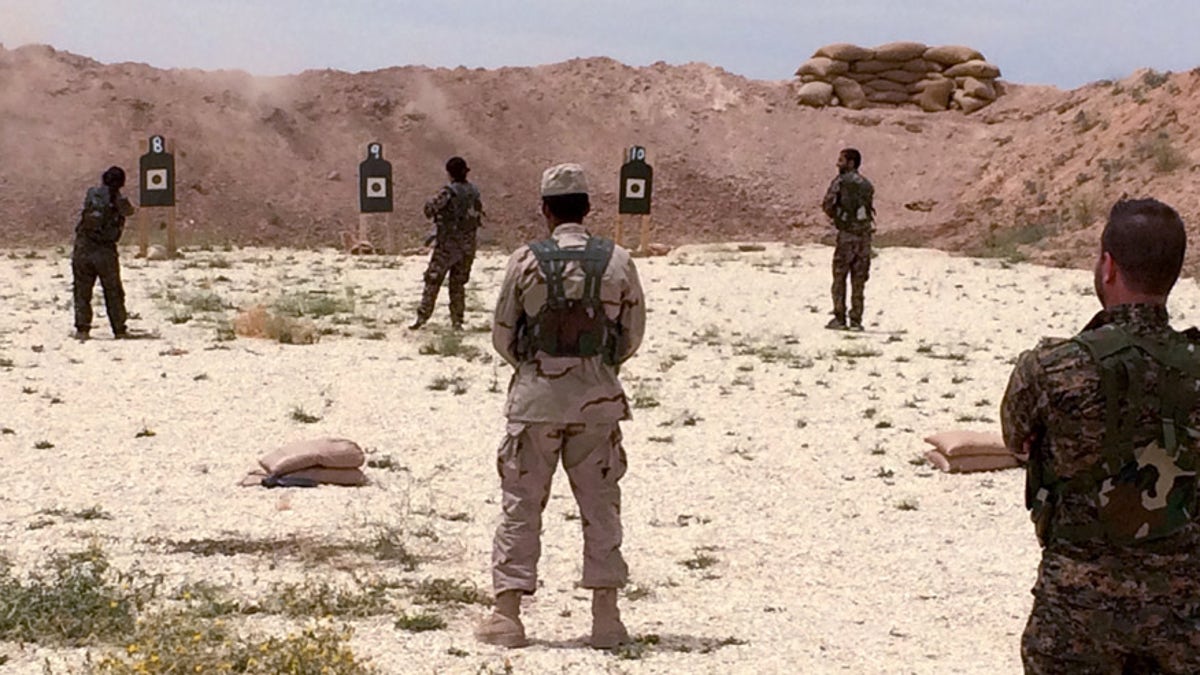
May 21, 2016: Syrian Arab trainees practice firing their small arms at an undisclosed training range in northern Syria. (AP)
A large Sunni Arab fighting force backed by U.S. special operations troops and fighter jets have launched an operation to recapture a key ISIS-held town in northern Syria 20 miles from the border with Turkey, a senior defense official told Fox News on Wednesday.
The official said the U.S. forces would “not be engaged in direct combat” during the operation to reclaim the city of Manbij -- a key access point for the Islamic State to move supplies and foreign fighters into Syria from Turkey.
Eighteen U.S. airstrikes in Manbij in the past 24 hours in Syria have destroyed ISIS headquarters buildings, weapons caches, training areas and six bridges, according to the daily strike report released by the U.S.-led coalition Wednesday morning. An unknown number of ISIS fighters also were killed according to officials familiar with the operation.
The number of U.S.-backed forces participating in the operation is in the “thousands,” but the official refused to disclose their precise size, citing operational security. The official said a small contingent of Kurdish fighters are also part of the ground force, but have pledged to return to their territory in Syria’s northeast following the clearing operation in Manbij, located west of the Euphrates River, historically Arab held territory.
The official acknowledged it was important to show NATO-ally Turkey that Arabs would take the lead in the operation. Turkey considers the Kurdish fighters known as the YPG a terrorist group, an extension of the Kurdistan Workers Party or PKK in Iraq. The United States and Turkey consider the PKK a terrorist organization, which has fought a guerrilla war against Turkey since the mid-80s killing tens of thousands of Turks.
The YPG has been a key ally for the U.S. military on the ground in Syria in the fight against ISIS. In January, YPG fighters captured Kobani, a Syrian city on the border with Turkey.
The State Department says the YPG is a separate entity from the PKK, despite historical links between the two groups. The YPG has roots in Marxist ideology and pledges allegiance to the PKK’s jailed leader Abdullah Öcalan.
Last week, photos published by AFP of U.S. special operations forces in Syria wearing patches of the YPG surfaced on the Internet, drawing outrage from Turkish officials.
Col. Steve Warren, a Baghdad-based spokesman for the U.S. military said Friday that U.S. forces wearing the YPG patches was “inappropriate” and that corrective action had been taken.
In February, the YPG opened its first foreign bureau in Moscow.
Over the weekend, an American commando was wounded in Syria north of the ISIS de-facto headquarters of Raqqa in a rocket or mortar attack, the first time the Pentagon has acknowledged a U.S. service member had been hurt inside Syria.
In a separate ISIS attack near Irbil in neighboring Iraq, another U.S. special operator was wounded last weekend as well, according to a Pentagon spokesman. He said Tuesday both ISIS attacks against the U.S. special operations troops did not involve “active combat.”
The Obama administration has gone to great lengths to avoid calling the deployment of some 5,000 U.S. troops to Iraq and nearly 300 to Syria as a “combat” deployment, stressing an advisory role to local forces away from the front lines.








































